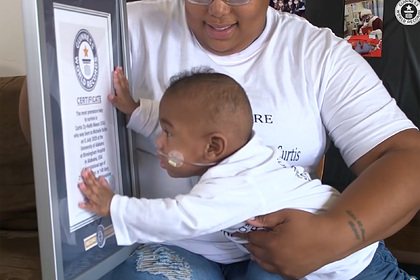A boy from the USA was born four months ahead of schedule and got into the Guinness Book of Records 
th week of pregnancy, that is, more than four months ahead of schedule. This is reported by the website of the Guinness Book of Records, which recognized Curtis Z-Keith Means as the most premature baby in the world who managed to survive.
The record-setting baby was born in Alabama in July 2020. As the mother of the child, Michelle Butler, said, initially the pregnancy proceeded without problems, but on July 4, 2020, she needed an urgent operation. The woman ended up at the University of Alabama Medical Center in Birmingham, which is famous for its departments of neonatology and pediatrics.
Butler wished to keep the baby, and Curtis, who was supposed to be born on November 11, was born on July 5. The gestation period at that time was 21 weeks and one day. The newborn weighed only 420 grams, and doctors believed that his chances of survival did not exceed one percent.
Nevertheless, the boy responded well to treatment and began to gain weight rapidly. “There have never been such premature babies in our neonatal intensive care unit. We literally walked through uncharted territory, ”recalls Professor Brian Sims.
Curtis spent ten months at the university hospital and on April 6, 2021, he was able to go home with his parents. During the entire recovery period, the child was looked after by a special team of doctors. “I am very proud of him, because I remember how he was born, and I see what he has become now,” admitted Michelle Butler.
The Guinness Book of Records named Curtis Z-Keith Means the most premature baby in history who managed to survive. Interestingly, the previous record holder, Richard Hutchinson from the American state of Wisconsin, was born exactly one month before Means, on June 5, 2020.
Earlier it was reported that in the UK, doctors managed to leave a premature girl with a whole list of diseases. The baby, whose birth weight was only 511 grams, spent seven months in intensive care.